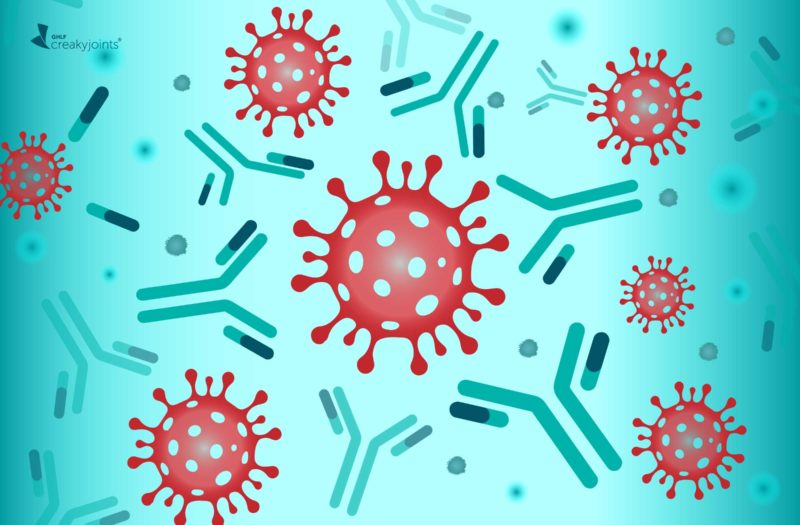Learn more about our FREE COVID-19 Patient Support Program for chronic illness patients and their loved ones.
An increasing body of research is pointing toward the possibility that COVID-19 causes the development of autoantibodies linked to other autoimmune diseases — and may be tied to the long-hauler symptoms associated with coronavirus.
In the latest preprint study (which means it has not yet undergone peer review) researchers analyzed the levels of 18 different autoantibodies between four groups:
- 29 unexposed pre-pandemic individuals from the general population
- 20 individuals hospitalized with moderate-to-severe COVID-19
- 9 recovering COVID-19-infected individuals with asymptomatic to mild viral symptoms during the acute phase, with samples collected between 1.8 and 7.3 months after infection
- 6 unexposed pre-pandemic subjects with lupus (an autoimmune disease that involves different kinds of autoantibodies)
Autoantibodies are antibodies that mistakenly target your own tissues or organs and are associated with diseases such as rheumatoid arthritis and lupus.
Unsurprisingly, the researchers found that autoantibodies were detected in five out of the six lupus subjects, compared to just 11 of 29 non-lupus, pre-pandemic controls.
However, the researchers also found that autoantibodies were detected in seven out of nine patients recovering from SARS-CoV-2 and in 12 out of the 20 hospitalized individuals with moderate to severe COVID-19. In the first group, autoantibodies were detected in all patients with reported persistent symptoms and two of the four without any long-term symptoms.
The autoantibodies that set SARS-CoV-2 infected patients apart from the pre-pandemic subjects are widely associated with myopathies (neuromuscular disorders), vasculitis (inflammation of the blood vessels), and antiphospholipid syndromes (when your body creates antibodies that make your blood much more likely to clot), all of which are conditions that share some similarities with COVID-19.
The researchers note that these results underscore the importance of further investigating autoimmunity during a COVID-19 infection, and the role of autoimmunity in lingering symptoms. That said, they do urge caution in interpreting the results, which still need to undergo peer review.
“It’s a signal; it is not definitive,” lead researcher Nahid Bhadelia, MD, told the New York Times. “We don’t know how prevalent it is, and whether or not it can be linked to long COVID.” (Long COVID is sometimes used to describe the syndrome that causes long-hauler symptoms in those who have recovered from COVID-19.)
Still, as many as one-third of COVID-19 survivors say they still experience symptoms — and determining the role autoimmunity may play after coronavirus infection is critical.
“This is a real phenomenon,” Dr. Bhadelia said. “We’re looking at a second pandemic of people with ongoing potential disability who may not be able to return to work, and that’s a huge impact on the health symptoms.”
Related research has uncovered similar findings around autoantibodies. A November 2020 study in the journal Science Translational Medicine found that 52 percent of 172 patients hospitalized for COVID-19 had at least temporary autoantibodies that lead to blood vessel blockages and clots.
Patients with severe COVID-19 have a high risk of blood vessel blockages of all sizes.
Meanwhile, an October 2020 preprint study found that more than 70 percent of COVID-19 patients studied (a total of 52 individuals) had antibodies against their own DNA and proteins that aid with blood clotting.
“Longitudinal [long-term] study of recovered patients will be critical in understanding the persistence of this autoreactive state, its role in the increasingly documented cases of ‘lingering’ COVID-19, and its propensity for conversion into self-sustaining autoimmunity in order to devise early rheumatological intervention strategies and establish effective long-term care protocols,” note the authors.
In other words, it remains to be seen whether some long-hauler COVID-19 patients could become patients with chronic autoimmune conditions. CreakyJoints and the Global Healthy Living Foundation will continue to follow this research closely.
Get Free Coronavirus Support for Chronic Illness Patients
Join the Global Healthy Living Foundation’s free COVID-19 Support Program for chronic illness patients and their families. We will be providing updated information, community support, and other resources tailored specifically to your health and safety. Join now.
Bhadelia N, et al. Distinct Autoimmune Antibody Signatures Between Hospitalized Acute COVID-19 Patients, SARS-CoV-2 Convalescent Individuals, and Unexposed Pre-Pandemic Controls. medRxiv. January 25, 2021. doi: https://doi.org/10.1101/2021.01.21.21249176.
Mandavilli A. How the Coronavirus Turns the Body Against Itself. The New York Times. January 29, 2021. https://www.nytimes.com/2021/01/28/health/coronavirus-antibodies-immunity.html.
Woodruff M, et al. Clinically identifiable autoreactivity is common in severe SARS-CoV-2 Infection. medRxiv. October 28, 2020. doi: https://doi.org/10.1101/2020.10.21.20216192.
Zuo Y, et al. Prothrombotic autoantibodies in serum from patients hospitalized with COVID-19. Science Translational Medicine. November 18, 2020. doi: https://doi.org/10.1126/scitranslmed.abd3876.






